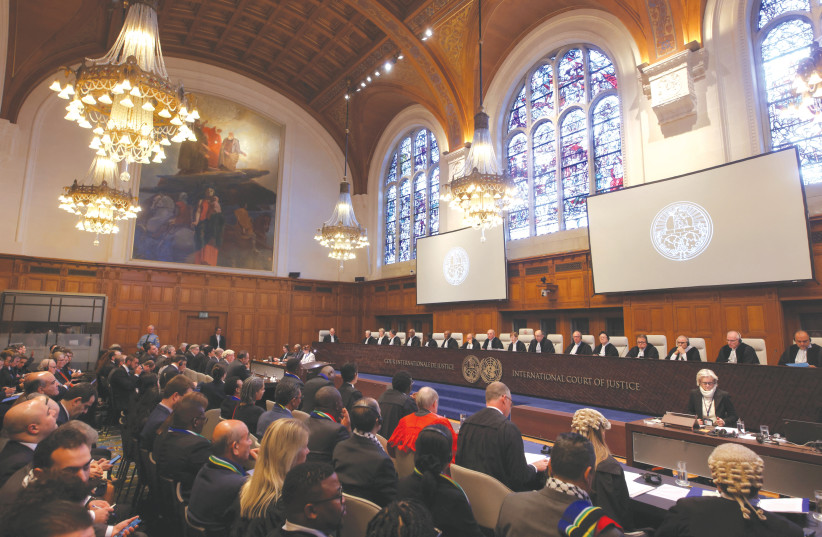There are three main ways that the International Court of Justice can come out today: A big win for Hamas and South Africa, a big win for Israel, or somewhere in the middle.
All of this is keeping in mind that there is no chance that the ICJ will declare today that Israel has committed genocide. If it came to that conclusion, and most observers find that unlikely, it would be 18 to 36 months away after extensive proceedings and evidence from both sides.
So the big loss for Israel would not be that, but rather an ICJ interim order to cease the war and withdraw all Israeli security forces from Gaza pending the later decision in 18-36 months.
How could the ICJ come to this conclusion when there is no possible way to reasonably read the Genocide Convention as applying to the IDF’s conduct?
How will the ICJ reach its verdict on Israel's war in Gaza?
First of all, the ICJ is a highly political body.
Lebanon, Somalia, Morocco, Brazil, China, and Russia are expected to vote against Israel due to their government’s positions against Israel during the current war.

There are some interesting, complex scenarios where China or Russia might not vote against Israel in order to achieve some other self-interest for themselves in confronting genocide charges (though in their cases, most Western officials believe that they have committed genocide), but other than that, Jerusalem is out six votes from the start.
However, Western democracies, such as the US, Germany, Slovakia, France, Japan, and Australia, are all expected to vote for Israel.
The swing votes in the case are Uganda, Jamaica, and India, but even those countries are expected to make some political calculations – simply put, they are not clearly on one side or another diplomatically.
Can Israel's war on Hamas be ruled a 'genocide'?
In terms of the law, even if the final substantive genocide case is weak, some judges could say they need to order Israel to stop the war given that around 25,000 Palestinians have been killed, probably over 60% civilians even according to IDF statistics, and the fact that it may remain an open issue.
Again, Israel could have strong claims that succeed down the stretch, but that might not stop the ICJ from issuing a cease and desist order.
Still, the ICJ knows that Israel would likely ignore the order and that many of its supporters in the West might also decry such a ruling.
In 2004, the ICJ declared Israel’s West Bank Wall illegal despite knowing that Jerusalem might ignore the ruling, but Israel has more sympathy, at least from many Western governments after October 7, than it had in 2004.
In any case, Israel could not be forced to comply because the US would veto any moves in the UN Security Council, the world’s only enforcement body.
But it desperately hopes there is no cease and desist order because its violation of that order could lead to diplomatic and economic sanctions as well as be a devastating public relations issue.
Probably the least likely scenario is a total Israeli win, with the case being thrown out without even getting to the more in-depth 18-36-month stage.
This would be the right legal decision, but once again, due to politics as well as the unprecedented number of dead Palestinians (“only” 2,100 were killed in the 2014 50-day conflict, and only about 50% were civilians), this is extremely unlikely.
Will Israel comply with the ICJ's ruling?
A very plausible option is a compromise in which the ICJ does not order the IDF to stop the war, but it orders a steep rise in permitting humanitarian aid.
Israel has allowed in humanitarian aid, but its security precautions have limited the speed and volume.
There might be some case where Israel would allow the aid in faster and drop some of its security checks to comply with such a ruling, partially out of gratitude for avoiding a worse ruling.
Also, Israel might agree to comply with the ruling, but then at some point only partially comply, claiming some new terrorist problem from Hamas, which could send the issue back to the ICJ, but only after further delay.
The ICJ could also search out other compromises, such as not ordering the IDF to desist just yet but putting some kind of future deadline for intense military operations or for the withdrawal of Israeli forces from all or most of Gaza.
It could also schedule a follow-up hearing in which it continues to reevaluate the issue to maintain pressure on Israel and reach a ceasefire point.
All of this could also impact the International Criminal Court, which has its own ongoing probe of Israelis.
Whichever way the ICJ rules on Friday, it will be history in the making for Israel, Hamas, and South Africa.
